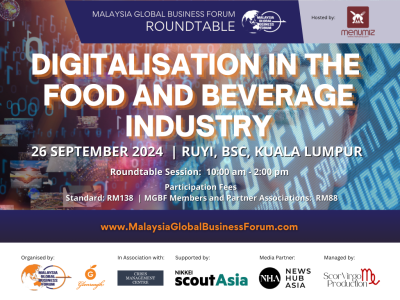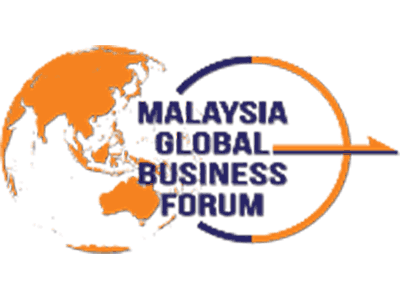
The three mega global trends of population growth, demand created by the economic shift of Millions out of poverty and the volatility of the environment have set the stage for a new era in global food security. This is changing how companies and countries invest into food production. What affects will the Trans Pacific Partnership Agreement (TPPA) have on food production and Investment?
Extracts from a recent interview with Nordin Abdullah:
What is the “Changing Paradigm in the Global Supply Chain”?
Food based inflation has become a real issues for nations to manage, it is something that the population has to deal with on a daily basis so they really feel it at the end of the month. A hungry population is an angry population, we saw this in the Arab Spring. Food based inflation was the tipping point that kicked this off in Tunisia. The problem is that global corporations are the major players in the global supply chain, they are the largest investors and control much of market so it is increasingly difficult for governments of the world to have a positive impact which improves the supply to the point that it reduces food prices for consumers. Then take all of that and multiple it by climate change and we see the changing paradigm of food security.
How will the Trans Pacific Partnership Agreement or the TPPA affect Malaysia and ASEAN?
The Trans Pacific Partnership Agreement of the TPPA in the short term will have minimal effect on the Malaysian Economy, mostly due to the fact that it will take several years before most of items with regards to food and agriculture will come into affect. Likewise the size of companies that are currently in the agri-food space in Malaysia will be exempt from most of the conditions. Areas that Malaysia will need to strength will be intellectual property and packaging legislation. Halal has also been exempted.
What is changing in terms of food producers’ understanding of consumer’s needs and how does that affects the supply chain and the thinking about investments?
Along with population growth, we are witnessing in many parts of the world Millions of people being elevated from poverty and Millions entering the middle class, this has changed consumer’s behaviour. Now the demand for proteins and processed foods has grown rapidly, According to USDA’s baseline projections, developing countries will account for much of the increase in projected growth in global consumption of meats and crops in 2013-22 period. The developing-country shares of the projected growth include 81 percent for meat, 83 percent for grains and oilseeds. This has created an opportunity and the thinking around investment into that part of the global food supply chain.
What are some of the specific opportunities that this has created and what strategies will be successful?
I like to think about it on two levels, the first is what are countries doing to improve their domestic food production, no doubt most countries will be able to produce all their food requirements but improving levels of self-sufficiency is important. There are several countries which need to look at other strategies due to population or resources constraints, they will need to look at investing and controlling to the point of ensuring supply of strategic food resources for their population. Both will require increased investment and increased understanding of food production, technology, logistics and the various financial models of each crop. To understand the current gap, the FAO estimates that USD83 Billion per year of additional investments in food, agriculture and rural development are required for the world to feed its growing population in 2050
How successful can Malaysia be in this context, what can corporations expect?
In terms of food security Malaysia has achieved a lot, in the context of a country coming out of developing world they have created a strong base in terms of the Palm Oil Industry and its’ global supply chain. Malaysia currently accounts for 39 % of world palm oil production and 44% of world exports. If taken into account of other oils & fats produced in the country, Malaysia accounts for 12% and 27% of the world’s total production and exports of oils and fats, this with a population just under 30 Million people. Now Malaysia needs to replicate that success with other products.
Malaysia has for the past decade positioned itself as the Global Halal Hub, how successful has this project been?
The demand for food in the Muslim World is high because many Muslim majority countries have low levels of self-sufficiency, this is the market that Malaysia is aiming to conquer. This will not be done overnight as there are many barriers that need to be overcome both trade and technical, the key to success will be the amount of investment that the country will be able to attract to achieve its ambitions.
What is technology doing to improve food security?
Technology, Standards and understanding the energy equation will be the key for success for companies looking to play a leading role in this sector. While the ‘Cloud’ has made the world flat it has also increased the technology requirement for food producers. Global food retailers want to have traceability from farm to fork and a myriad of standard compliance on various levels for suppliers because the high-end consumers in Europe and America are demanding these standards, so suppliers need to understand the full requirements of a market not just the fact that they want a specific food item. There is a lot of things changing that is the opportunity and the risk.
Services
Stakeholder mapping, analysis, engagement and communication needs to be detailed to avoid business losses or even worse, a crisis. How can you do this effectively to prevent failure? ...
Data-driven business decisions have never been as crucial, especially in this era. MGBF leverages off, technology, experience and market presence to aid businesses in making accurate decisions. ...
MGBF provides comprehensive strategic advice and results-focused solutions to solve clients' problems in business-government relations so they can focus on their core business. ...
A critical business challenge is meeting the right decision-makers and potential buyers through the best channel and platform. How will you improve your business competency? ...
Upcoming Events
MGBF founding chairman Nordin Abdullah and UMW Toyota president Datuk Ravindran K. will delve into the convergence of automotive innovation and environmental sustainability in Penang, Sarawak, Johor and Pahang.
Hosted by menumiz™ – an end-to-end restaurant management system – this roundtable will feature a case study presentation and a panel session to discuss the latest digital trends, challenges, and opportunities within the food and beverage sector.
In this episode of 'A Working Lunch with Nordin', MGBF's founding chairman, Nordin Abdullah, will host this discussion focusing on the biggest threats and opportunities for businesses as we look to manage change in the South China Sea.
This MGBF Roundtable will focus on regional food security issues and trends in the regional supply chain, and trade regulations and policies, including a new geopolitical tool i.e., weaponisation of supply chains.
MGBF In The News
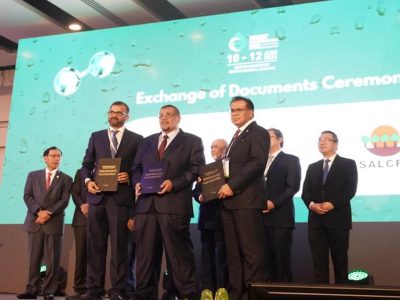
Planet QEOS, KIS BlOCNG San Bhd, and the Sarawak Land Consolidation and Rehabilitation Authority (SALCRA) have officially signed a tripartite memorandum of understanding (MoU) to establish a collaborative framework aimed at producing bio-hydrogen via the Steam Biomethane Reforming (SBMR) Process. The MoU was signed by Planet QEOS executive chairman Dino […]
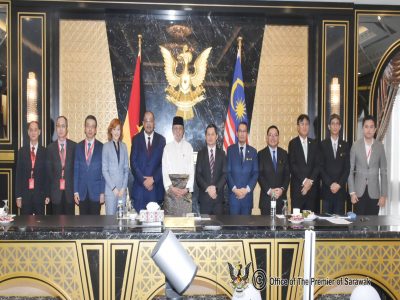
Planet QEOS and China Machinery Engineering Corporation (CMEC) are interested in investing RM10 billion to co-develop advanced Megawatt peak (MWp) agrovoltaic in Baram, to further boost Sarawak’s green energy initiative and food security. Sarawak Premier Datuk Patinggi Tan Sri Abang Johari Tun Openg was briefed on Friday by both the […]

Last week SPM results came out, 373,974 aspirants who have been waiting patiently over the last few months would now know their fate. Some 10,109 have received all A’s, the golden standard of academic success and the ticket to those looking to study the “more advanced” subjects in university. Proudly, […]

The classic knee-jerk reaction is to say, fire the coach, change the leadership of associations, and reduce the funding till they start performing better. This kind of negative reinforcement may work for kindergarten children, but we are dealing with high-performance adults – individuals much further along in their psychological and […]
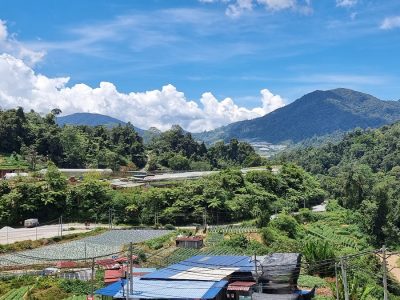
Since its earliest tea plantations in 1929, Cameron Highlands has grown to become a key player in the agricultural landscape of Malaysia, producing 40 per cent of all vegetables grown. Despite Malaysia shifting its economic focus away from agriculture, the industry remains imperative for food security and the livelihoods of […]

Although at first glance the travel industry and the agricultural sector appear to have nothing in common, they actually share more than meets the eye. The economic benefits of tourism to the agricultural sector can be multiplied several times over. “Tourism brings the end consumers closer to the source, which […]
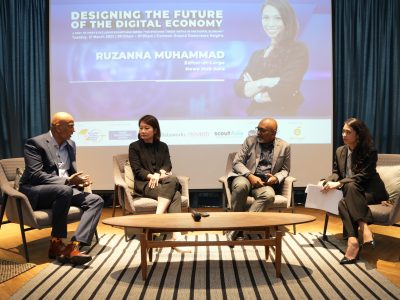
The Malaysia Global Business Forum (MGBF) recently held a high-level roundtable themed ‘Designing the Future of the Digital Economy’, attended by industry leaders and business associations. The guest of honour was Yang Berhormat Syerleena Abdul Rashid, the Member of Parliament (MP) for Bukit Bendera in Penang. The MP’s Special Session […]

The Malaysia Global Business Forum (MGBF) will be hosting a roundtable on ‘Designing the Future of the Digital Economy’ on 23 February 2023. It is the culmination of the first three MGBF Exclusive Roundtable Series titled ‘The Evolving Threat Matrix in the Digital Economy’ held throughout 2022. According to the […]
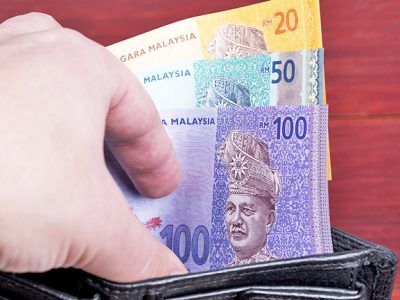
The Founding Chairman of the Malaysia Global Business Forum (MGBF), Nordin Abdullah, today spoke on Bernama TV’s leading English talk show, The Brief, hosted by Jessy Chahal, on the topic of a stable political reality and what that means for the Malaysian economy. Nordin said, “The first thing that it […]

More than 1,100 years ago, Muhammad ibn Musa al-Khwarizmi was developing the mathematical formulas that we know today as algorithms which now have become so intertwined with the business fortunes of global media giants and the very fabric of geopolitics. A series of recent high level international reports have revealed […]
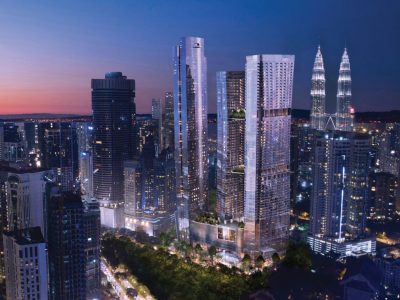
KSK Land has been recognised by the Malaysia Global Business Forum (MGBF) for its role in attracting high net-worth individuals to Malaysia post-pandemic. The first challenge in investor attraction is “selling” the country. In the context of Asia, Malaysia is competing with some very established investment destinations. The second […]

Malaysia, in particular Kuala Lumpur, continues to position itself as a regional centre to do business, educate a family and enjoy a global lifestyle. One company, KSK Land, has taken the lead in positioning itself and the city of Kuala Lumpur as a property investment destination for the global citizen […]
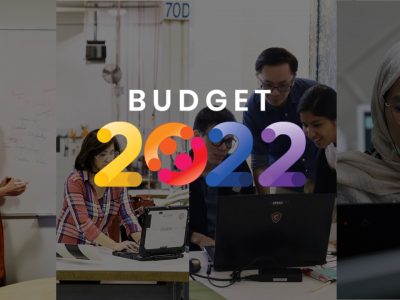
The upcoming budget represents an opportunity to build resilience in the critical sectors that will form the backbone of the country’s future-facing economic ambitions. This however needs to be achieved in the context of managing the community sectors most impacted by COVID-19 over the past two years. The Keluarga Malaysia (Malaysian Family) […]

Malaysia Global Business Forum (MGBF) has moved to support the creative economy as the overall economy moves into a recovery phase following the COVID19 pandemic. As a step in the direction of normalcy, the MGBF has agreed to host the art exhibition “I Know You’re Somewhere So Far” by one […]
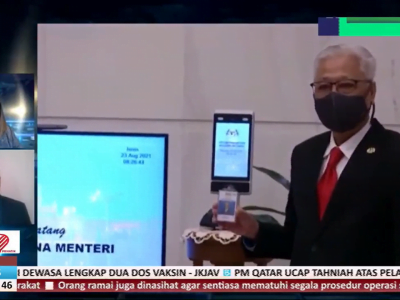
Congratulations to Datuk Seri Ismail Sabri Yaakob for taking up the mantle of the ninth prime minister of Malaysia. There is nothing normal about the situation; it could not have been scripted but it has kept the spectrum of media, mainstream and social, gripped. The first order of business for […]
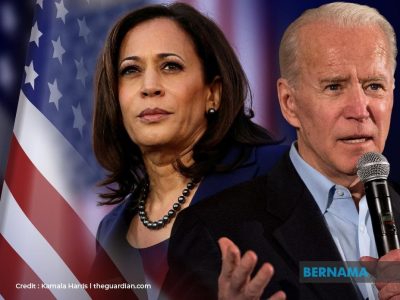
In a stirring speech to the nation, President Joseph R. Biden, Jr. stamped his brand of leadership on the presidency, in his first act as the 46th president of the United State of America, it signaled several shifts. Perhaps the weather was foreboding with snow falling before the ceremony that […]
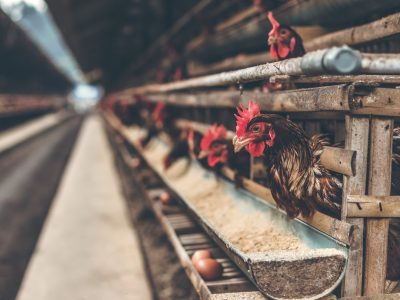
KUALA LUMPUR, 6 July 2022 – As the global economy continues to deal with unprecedented levels of disruption caused by the pandemic and the conflict between Russia and Ukraine, the convergence of energy security and food security issues has become a front-of-mind issue faced by policy makers and consumers alike. […]

KUALA LUMPUR, 23 June 2022 — Malaysia Global Business Forum (MGBF) ties up with scoutAsia to ensure that businesses are equipped with deeper regional insights. The past two years has seen a massive shift in the way businesses are conducted with digitisation, digitalisation and automation continuously being adopted to improve […]
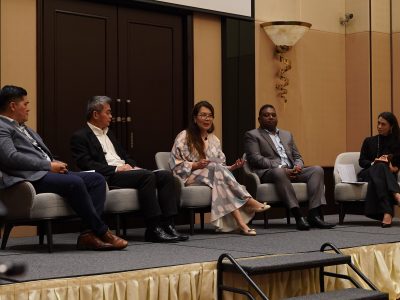
KUALA LUMPUR, 25 May 2022 – The Malaysia Global Business Forum (MGBF)’s exclusive roundtable on ‘Security Concerns in Critical Value Chains’ was held in a hybrid setting yesterday at the Eastin Hotel Kuala Lumpur. The guest of honour was Yang Berbahagia Tan Sri Dato’ Seri Rafidah Aziz, former minister of […]










